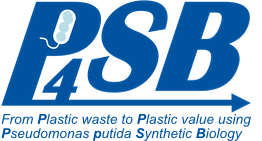Objectives

The main objective of P4SB is the biotransformation of non-sustainable plastic waste (e.g., polyethylene terephthalate and polyurethane) into sustainable value-added alternative materials such as biodegradable plastic polyhydroxyalkanoates (PHA).
The efforts include four separate constituents that, besides having strong merit on their own, are integrated to a greater whole thanks to the connectivity between the inputs and outputs of each of them within the over-arching conceptual and technical framework of Synthetic Biology.
These components include the following poles of activity:
- Genetic and biochemical engineering of a process for an all-biological depolymerisation of polyethylene terephthalate (PET) and polyurethane (PU) into their monomeric constituents.
- Implementation of enzymatic routes enabling a designer P. putida strain to metabolise the resulting plastic monomers into central building blocks (e.g., acetyl-CoA)
- Orthogonalisation and optimisation of the production of polyhydroxyalkanoates (PHA) and other commodity chemicals by the monomer-metabolizing P. putida.
- Development of synthetic modules for release and recovery of intracellular PHA from the thereby engineered P. putida Cell Factory.
